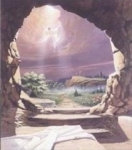Recently I posted some tentative thoughts relating to the crowds on Palm Sunday and Good Friday and wondering how authentic or otherwise they might have been. Eventually I found someone vaguely on the same wavelength when I visited Simon Jones’ blog (see ‘Better Blogs’ list) who noted that Jesus was somehow the still centre in the turmoil and muddle of what was happening. A relief to know I was not totally alone in my thinking!
However, the comments and humour that flowed from that post made for interesting reading and, eventually got me back round to thinking about crowd mentality. The coded references to parts of Leicestershire and reminiscences of childhood TV programmes at first sight had nothing to do with what I was thinking about and, indeed, in isolation still don’t. But Andy’s suggestion that Windy Miller was a non-stipendiary minister (despite looking more like a stereotypical Quaker) got me pondering the ‘spirituality of Trumptonshire’ (obviously I do not have enough ‘real’ work to do!).
As far as I can recall, there was no designated ‘place of worship’ (i.e. a church building) in Trumpton, Camberwick Green or Chigley. So, if Andy’s suggestion is right, then Windy’s congregation must have met either in the open air or a hired building. Perhaps Windy was really an early Methodist rather than a Quaker and rode around on his penny-farthing trike from village to village? Anyway, with this thought I warmed to the idea of playing with ideas about Trumpton spirituality and wondered fleetingly how it reflected or anticipated real world experiences…
Trumptonshire was, it seems, modelled on the Midland shire counties – apparently Melton Mowbray was one of the ‘models’ used. Strange then, given their significance in the emergence of Protestant non-conformity that in Trumptonshire there are no churches or chapels, let alone clergy (after all even 1980’s Postman Pat has a vicar in Greendale!). What defines and shapes Trumptonshire is not expressed in terms of a faith but some sort of middle class, middle England image of community spirit. In Trumpton it is the town hall clock striking 9:00 a.m. and the evening Fire Brigade band concert at which everyone congregates (!) to be reminded that all is well. In Chigley it is the village dance that follows the 6 o’clock whistle at the biscuit factory when the workers seem to entertain those who have no need of such employment, and once more there is a sense that all is right with the world before sundown.
Trumptonshire was a good place to live – there were never any fires, no crime, only minor ailments for Dr Mopp to treat and Lord Belborough seemed to be as happy talking to Chippy Minton as to any of the local gentry. The stories were incredibly innocent but brought lots of pleasure to 1960’s children. It is too easy to pick holes and risk sullying otherwise precious memories. But I do wonder how much the stories created an illusion of ‘community’ that did not exist even in then.
Perhaps the stories had no church because they never mentioned Sunday, or perhaps in the story tellers mind church was already an irrelevence. Either way it does seem that Trumptonshire complete with its nice statue of Queen Victoria in the town square and impeccable morals, was already reflecting a 'post Christian' society.'
The good people of Trumpton seemed happy enough to go with the flow and gather to hear the Fire Brigade band play the same tune every week, whilst the crowd at Chigley enjoyed the repetitive village dancing. It was good TV for tinies, who love repetition and the security created by a familiar routine, and that’s undoubtedly the real motivation, but if I postulate for a moment that the crowds in the stories behaved like real crowds, then how authentic or otherwise was their behaviour? Did they really enjoy life in Trumptonshire or were they just swept along by events?
All of which goes to how that if you try hard enough you can connect any random pair of ideas!!!
And as for Windy Miller, we now know he gets distracted by young female joggers after he eats Hovis… but that’s another story.
